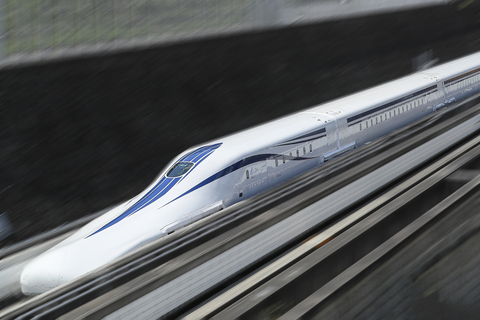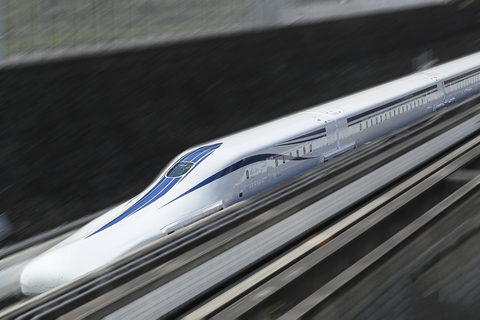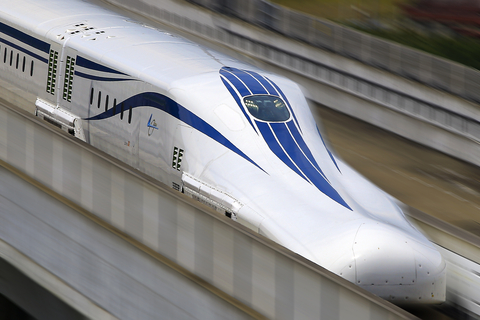SEATTLE--(BUSINESS WIRE)--Amazon Web Services, Inc. (AWS), an Amazon.com, Inc. company (NASDAQ: AMZN), today announced that the Central Japan Railway Company (JR Central), which provides high-speed railway services to more than 170 million passengers through Tokaido Shinkansen annually, is using AWS technologies to enhance operations for its Yamanashi Maglev Line. By building critical IT infrastructure workloads on AWS and using AWS's Internet of Things (IoT), machine learning (ML), and generative artificial intelligence (AI) capabilities, JR Central will advance its data-driven operations, drive operational efficiencies, and reduce maintenance costs.
JR Central is preparing to launch the next generation Super Conducting Maglev (SC Maglev), an ultra-high-speed train that travels at twice the speed of bullet trains by floating and propelling above the tracks using magnetic forces. This new high-speed train service, which is in trial operation in the Yamanashi Maglev Line and expected to travel at speeds of up to 500 km per hour, will cut train travel times in half. For example, Chuo Shinkansen, a new line that is currently under construction, uses the SC Maglev system to take passengers from Tokyo to Nagoya in 40 minutes (versus 86 minutes) and Tokyo to Osaka in 67 minutes (versus 134 minutes). The Chuo Shinkansen will serve as a backup route to the Tokaido Shinkansen in case of emergencies, such as major earthquakes, creating a dual high-speed rail artery.
AWS’s ML and IoT capabilities allow the Yamanashi Maglev Line to use railway infrastructure monitoring data, generated by power lines and electronic track inspection vehicles, to detect signs of impending failure and take corrective action. These insights allow JR Central to predict outages and equipment failure, optimizing the deployment of railroad maintenance workers. For example, the company built an ML model with Amazon SageMaker that identifies power transmission equipment abnormalities. The rail operator visualizes the data with Amazon QuickSight, a cloud-based business intelligence service, to identify machine irregularities, enabling preemptive maintenance to prevent outages and service disruptions. In the future, the Yamanashi Maglev Line plans to use Amazon Bedrock, the easiest way to build and scale generative AI applications with foundation models, to provide employees with recommended actions to take based on equipment manuals and maintenance records.
“By accelerating various innovations using AWS in the Yamanashi Maglev Line, we will realize the future vision of high-speed railway operations,” said Motoaki Terai, senior corporate executive officer, director general of the Maglev System Development Division of the Chuo Shinkansen Promotion Division, Central Japan Railway Company. “At JR Central, we're committed to delivering new transportation solutions for our passengers using innovative technology. Our next-generation SC Maglev train line will not only revolutionize travel between Tokyo, Nagoya, and Osaka, but it will also set new global standards for efficiency and safety through data-driven operations.”
To drive cloud proficiency across its organization, JR Central’s Maglev System Development Division works with AWS to provide hands-on employee cloud skills training. In 2023, the AWS Professional Services ML Talent Development Support Program trained the division’s mechanical engineers to build and optimize an ML model that identifies power transmission equipment abnormalities.
“Japan’s world-leading transportation sector is leveraging the cloud to make high-speed rail safer, more efficient, and more enjoyable for passengers,” said Jaime Vallés, vice president and general manager, Asia Pacific and Japan at AWS. “Built on AWS, JR Central has the resiliency and innovation needed to offer one of the world’s fastest and most advanced train services operation, using the power of generative AI, machine learning, and data to drive unmatched efficiency. Our partnership is just getting started, and we look forward to pushing the bounds of what’s possible in train travel.”
About Amazon Web Services
Since 2006, Amazon Web Services has been the world’s most comprehensive and broadly adopted cloud. AWS has been continually expanding its services to support virtually any workload, and it now has more than 240 fully featured services for compute, storage, databases, networking, analytics, machine learning and artificial intelligence (AI), Internet of Things (IoT), mobile, security, hybrid, media, and application development, deployment, and management from 108 Availability Zones within 34 geographic regions, with announced plans for 18 more Availability Zones and six more AWS Regions in Mexico, New Zealand, the Kingdom of Saudi Arabia, Taiwan, Thailand, and the AWS European Sovereign Cloud. Millions of customers—including the fastest-growing startups, largest enterprises, and leading government agencies—trust AWS to power their infrastructure, become more agile, and lower costs. To learn more about AWS, visit aws.amazon.com.
About Amazon
Amazon is guided by four principles: customer obsession rather than competitor focus, passion for invention, commitment to operational excellence, and long-term thinking. Amazon strives to be Earth’s Most Customer-Centric Company, Earth’s Best Employer, and Earth’s Safest Place to Work. Customer reviews, 1-Click shopping, personalized recommendations, Prime, Fulfillment by Amazon, AWS, Kindle Direct Publishing, Kindle, Career Choice, Fire tablets, Fire TV, Amazon Echo, Alexa, Just Walk Out technology, Amazon Studios, and The Climate Pledge are some of the things pioneered by Amazon. For more information, visit amazon.com/about and follow @AmazonNews.





